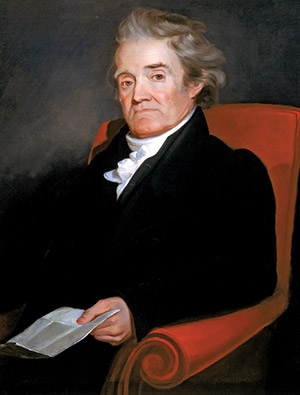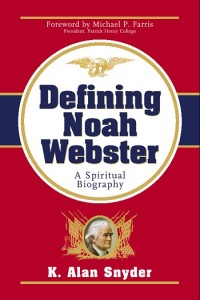 I spent a number of years researching Noah Webster, who became the subject of my doctoral dissertation. He’s known primarily for two things: his Speller, which taught Americans to read and write correctly; his dictionary, a monumental effort of about twenty years of his life, and which defined terms in the context of his Biblical worldview.
I spent a number of years researching Noah Webster, who became the subject of my doctoral dissertation. He’s known primarily for two things: his Speller, which taught Americans to read and write correctly; his dictionary, a monumental effort of about twenty years of his life, and which defined terms in the context of his Biblical worldview.
Webster started out his career as a devotee of the Enlightenment, that movement of the eighteenth century that gave far more credit to human reason than human reason should allow. But he came to the end of his faith in human reasoning that sought to separate itself from God’s revelation. In 1808, he experienced a solid Christian conversion that affected all his works from then on. All his educational efforts were henceforth directed to pointing men to the One to whom they all must answer someday.
His conversion also provided a more Biblical concept of government and education. As he wrote to one of his personal correspondents in 1836,
An attempt to conduct the affairs of a free government with wisdom and impartiality, and to preserve the just rights of all classes of citizens, without the guidance of Divine precepts, will certainly end in disappointment. God is the supreme moral Governor of the world He has made, and as He Himself governs with perfect rectitude, He requires His rational creatures to govern themselves in like manner. If men will not submit to be controlled by His laws, He will punish them by the evils resulting from their own disobedience.
Any system of education, therefore, which limits instruction to the arts and sciences, and rejects the aids of religion in forming the characters of citizens, is essentially defective.
In my view, the Christian religion is the most important and one of the first things in which all children, under a free government ought to be instructed.… No truth is more evident to my mind than that the Christian religion must be the basis of any government intended to secure the rights and privileges of a free people.
When I was taking doctoral courses in history, more than once my professors hinted at the idea that we, in our day, are naturally more knowledgeable and possess more wisdom than those in earlier, more primitive, ages. Well, when I read comments such as Webster’s above, I just kind of smile inwardly at the arrogance of our learned elite today. No, there are some things that earlier generations understood much better than we do now.
 If you would like to delve deeper into Noah Webster, his thoughts, and his times, I recommend my doctoral dissertation, which is now in book form. A lot of time and effort went into this book, and I can say I’m pleased with the result. I believe it has stood the test of time and offers some real insights into a man who devoted the last half of his life to promoting God’s truths.
If you would like to delve deeper into Noah Webster, his thoughts, and his times, I recommend my doctoral dissertation, which is now in book form. A lot of time and effort went into this book, and I can say I’m pleased with the result. I believe it has stood the test of time and offers some real insights into a man who devoted the last half of his life to promoting God’s truths.
